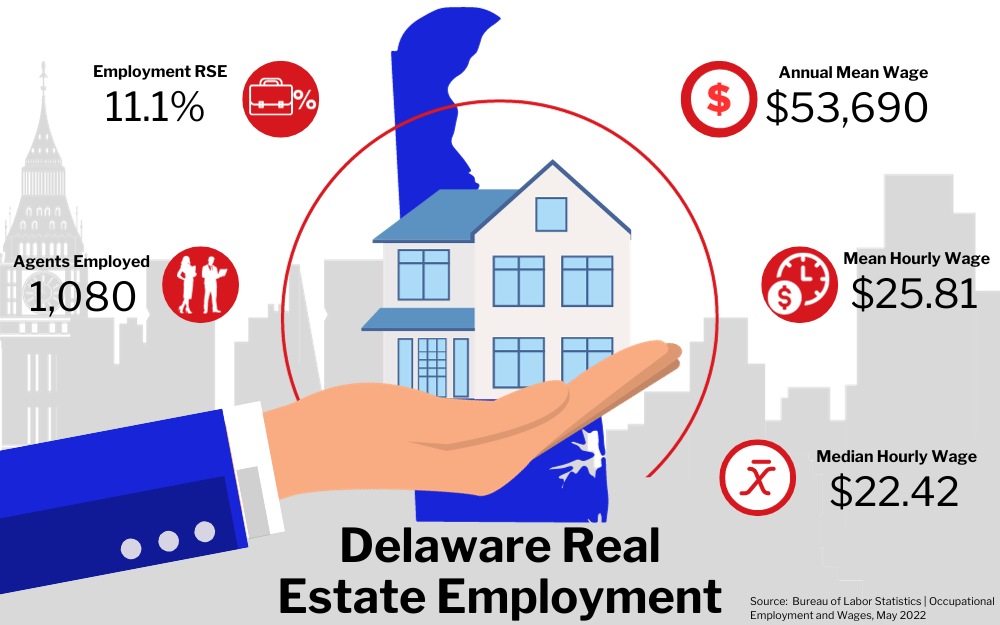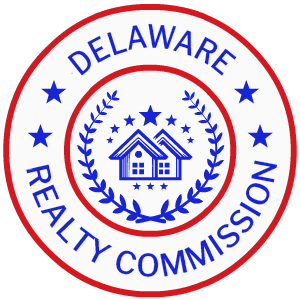
Earning a real estate agent license in Delaware requires aspiring agents to meet key requirements; education, exam, legal, and financial requirements set by the Delaware Realty Commission. While the process may initially seem daunting, following the Delaware Real Estate Commission (DREC) guidance can help aspiring agents and brokers navigate steps like education,1 testing, and application submission efficiently in order to launch a professional real estate career.
This guide provides everything applicants need to successfully qualify for and obtain a real estate license from the Delaware Realty Commission.
Here is a quick overview of key facts:
- First-time applicants must complete 99 hours of pre-licensing education from an accredited school before applying for a license.
- All license applicants must submit fingerprints for an FBI and state criminal background check.
- The Delaware Realty Commission administers a 2-part real estate exam covering national topics and state-specific laws. The pass rate for first-time applicants is around 62%.
- New licensees (referred to as real estate salespersons) must affiliate with a sponsoring brokerage firm and cannot practice independently right away.2
- Active real estate agents must maintain errors and omissions (E&O) insurance coverage.
- The salesperson license must be renewed every 2 years upon completing the required continuing education.
- Delaware has reciprocity agreements with every U.S. state, making it easy to transfer an active out-of-state license through endorsement.
Earning a real estate license involves more than just taking a course and passing a test. The Delaware Realty Commission has set mandatory prerequisites to ensure that all agents have built a foundation that demonstrates they are prepared for the duties and responsibilities of this important role.
Here is an overview of the main requirements applicants must meet:
- Age: Applicants must be legal U.S. residents and at least 18 years of age or older.
- Education: Complete the requisite number of hours of approved pre-licensing courses that cover core real estate law, practices, sales, ethics, and math concepts.
- Testing: Pass the Pearson VUE real estate exam which assesses your retention of general principles and Delaware state laws.
- Financial: Obtain active errors and omissions insurance coverage and pay all licensing fees.
- Legal: Submit fingerprints for an FBI and state criminal history background check.
- Application: Successfully completed all documentation, processes, and steps for submitting a license application through Delaware’s online DELPROS system.
- Sponsorship: Secure a sponsoring brokerage whom you will affiliate your license with as a Delaware real estate salesperson.
Each of these aspects will be explained in detail throughout this guide.
Delaware Real Estate Agent Requirements
To qualify for and maintain a real estate license in Delaware, candidates must fulfill and continuously meet the baseline criteria. These prerequisites ensure that all practitioners have the skills, ethics, and resources to conduct real estate transactions responsibly.
Here are the key requirements in detail:
Minimum Age and Core Academic Requirements
The Delaware Real Estate Commission mandates that all license applicants must be at least 18 years old and be legal residents of the United States.2
Reaching DREC’s minimum age requirement ensures that real estate agents have attained an acceptable level of maturity and life experience needed to effectively advise clients as they are making major financial decisions.
Although holding a high school diploma or equivalent GED certificate is not an official prerequisite, most real estate schools prefer students to have a diploma or minimum education level before enrollment. Additionally, earning a high school diploma or GED provides evidence that an applicant possesses the basic academic abilities, including reading comprehension, required to successfully complete the real estate curriculum.
When researching pre-licensing programs, check each provider’s enrollment requirements to confirm if they require proof of a high school diploma or transcript for admission. Some programs allow candidates to self-certify that they meet the minimum education level while others require documentation like a copy of your diploma or official transcripts.
Prescribed Pre-License Course Duration
First-time Delaware real estate license applicants must complete a total of 99 hours of state-approved pre-licensing education before applying for a license. These educational hours ensure that all new salesperson and broker candidates have mastered the foundational concepts and competencies needed to facilitate real estate transactions ethically and legally in Delaware.
The number of compulsory pre-licensing course hours also depends on your specific background as follows:
First-Time Applicants
First-time applicants must complete 99 hours of salesperson pre-licensing education or its equivalent before applying for a license.2 These 99 hours must cover:
- Real Estate Orientation (3 hours)
- Real Estate Sales (36 hours)
- Real Estate Law (33 hours)
- Real Estate Mathematics (24 hours)
- Review for Sales, Law, and Mathematics (3 hours)
On completion, candidates must then pass the Pearson Vue Delaware Real Estate Salesperson Exam to demonstrate competence.
Licensed Attorneys
Attorneys who are actively licensed to practice law in Delaware are required to complete an abbreviated 12-hour pre-licensing course focused on state brokerage relationships, contracts, and real estate closings.
Individuals With a Current Out-of-State License
Applicants who are already licensed as a real estate salesperson or broker in other U.S. jurisdictions may also qualify for partial exemptions from Delaware’s pre-licensing education mandates.
All other first-time applicants must complete the full 99-hour salesperson pre-licensing curriculum through an authorized Delaware provider: Pearson Vue.
The 99 mandatory pre-licensing hours provide a thorough grounding in topics like:
- Real estate law, regulations, and practices
- Roles, responsibilities, and relationships of buyers, sellers, and brokers
- Property valuations and appraisal methods
- Financing options and calculations
- Contracts, disclosures, and legal forms
- Best practices for facilitating transactions and closings
- Professional standards and ethics
The course focuses on both general real estate principles and Delaware-specific laws and practices. Showing that you have completed the curriculum demonstrates substantive understanding and command of the real estate practices and concepts.
Once finished, you will be ready to apply this knowledge when sitting for the Delaware real estate licensing exam.
Fee Structure for Pre-Licensing Real Estate Education
Pre-licensing courses are available through Delaware Real Estate Commission-approved providers in different formats including:3
- On-demand online courses allowing self-paced learning
- Interactive live-streamed lectures
- In-person classroom sessions
In terms of costs, pre-licensing education ranges from $300 on the low end for more budget-friendly self-paced online courses to upwards of $1000 for comprehensive in-person classroom packages. Additional exam prep materials can cost $50 to $200.
Variables impacting price include:
- Choice of Provider: Some real estate schools offer more robust supplemental materials, exam prep, and student support
- Delivery method: Physical classroom programs tend to cost more than interactive virtual or online on-demand courses
- Any money-back guarantees if you fail the licensing exam
- Convenience fees for payment plans or digital course materials access
Regardless of the choice of provider and education format, the most important thing is completing the state-approved education in a manner that fully prepares you for the license exam and in your preferred learning style. When choosing a provider, compare curriculums, pass rates, and components like format, study resources, and instructor availability.
The DREC website provides a list of approved education providers delivering qualifying pre-licensing programs, both within Delaware and through national virtual education companies.3
Aspiring agents are responsible for researching different qualifying options both locally and online to find the 99-hour package best fitting their budget and learning preferences. Just be certain the courses satisfy the academic requirements.
The investment in pre-licensing education leads to valuable preparation for the state exam and builds a foundation for an exciting career in real estate.
Core Background Check for Real Estate Licensing (Fingerprinting Facility Details)
A critical component of qualifying for a Delaware real estate license involves passing a fingerprint-based criminal history records check.
Applicants must schedule an appointment to submit fingerprints at an approved location. The collected fingerprints are transmitted to the Delaware State Bureau of Identification to check for any potentially disqualifying offenses.4
The background check report is then shared internally with DREC for review.
Fingerprinting fees are approximately $65. It takes 2 to 4 weeks to process the full results. Certain criminal convictions within the past 5-10 years may disqualify candidates from holding a real estate license in Delaware.
References
1Delaware.gov. (2023). Real Estate Commission. Delaware.gov. Retrieved October 26, 2023, from <https://dpr.delaware.gov/boards/realestate/>
2Delaware.gov. (2023). Salesperson Licensure. Delaware.gov. Retrieved October 26, 2023, from <https://dpr.delaware.gov/boards/realestate/ressalesperson/>
3Delaware.gov. (2018, April 3). Delaware-Approved Pre-Licensing Course Providers Contact Information. Delaware.gov. Retrieved October 266, 2023, from <https://dprfiles.delaware.gov/realestate/Approved_Pre-Licensing_Providers-Contact_Info.pdf>
4Delaware.gov. (2023). State Bureau of Identification. Delaware.gov. Retrieved October 26, 2023, from <https://statefirecommission.delaware.gov/wp-content/uploads/sites/103/2017/07/BackgroundChecks.pdf>
